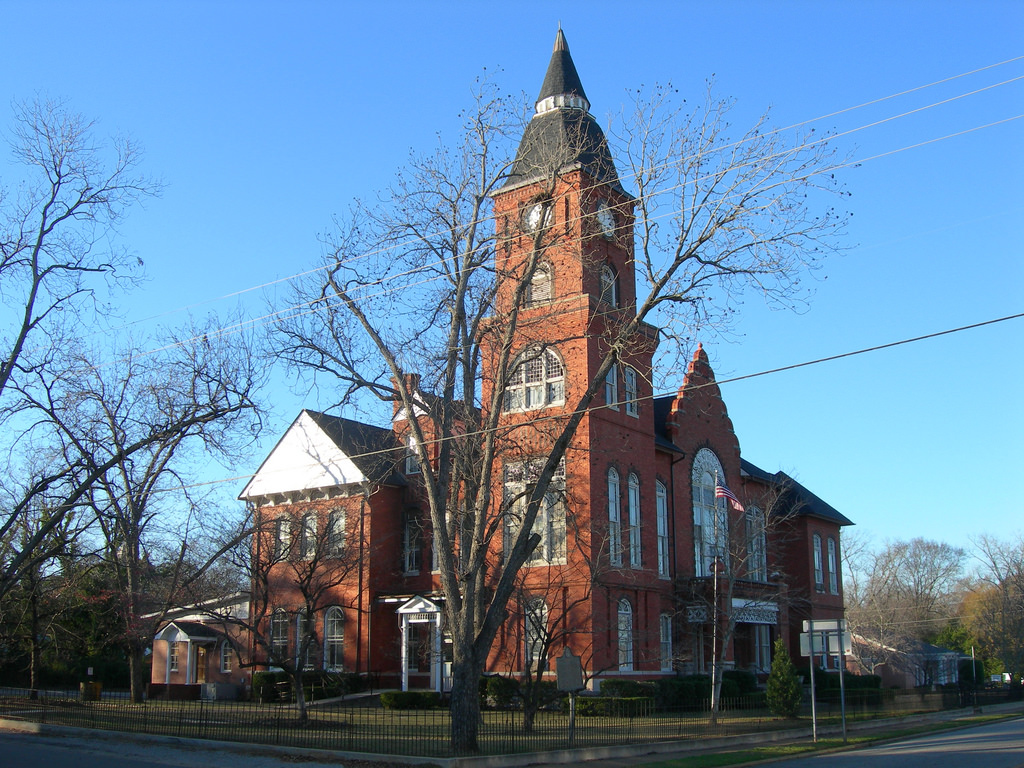
CUTHBERT, Ga. — Officials in a predominantly black Georgia county fired a consultant amid widespread backlash to a proposal that would close most polling places in the area three months ahead of a potentially historic election.
Consultant Mike Malone had advocated consolidating the polling sites after he was hired in April. Randolph County lawyer Tommy Coleman sent Malone a letter Wednesday ending the contract, according to a copy of the letter Coleman gave The Associated Press on Thursday.
Despite the firing, the Randolph County Board of Elections will still — for now — hold a vote Friday on whether to eliminate seven of the rural county’s nine polling places ahead of this fall’s pivotal midterm elections.
Malone did not respond Thursday to a voicemail seeking comment.
County officials have said they’re considering closing polling locations that are inaccessible to voters with disabilities, and argued they cannot afford to make the buildings compliant with the Americans with Disabilities Act. But critics say the closures will disenfranchise the county’s electorate ahead of an election in which Stacey Abrams is attempting to become the country’s first black female governor. Another black woman, Democrat Joyce Barlow, is running for a state legislative seat in an attempt to oust a white conservative who is a 35-year incumbent and a native of the area.
Abrams and her Republican opponent, Secretary of State Brian Kemp, have opposed the measure.
With a mostly African-American population of about 7,000, Randolph County is one of the state’s smallest and poorest rural communities. The proposal has garnered national attention — and energized black voters to become more involved in the political process.
On Wednesday, two days before the board of elections vote, residents gathered at the Stonehouse Restaurant to rally against the measure. Volunteers scrambled to collect 400 signatures — 20 per cent of registered voters in the county — needed to block the vote. The ACLU of Georgia is threatening to sue, arguing that the burden of driving to the remaining polling places will fall disproportionately on black residents.
On Thursday, leaders of the Georgia Legislative Black Caucus and the Congressional Black Caucus strongly urged the county not to go forward with the proposal.
In a letter to Randolph County officials, the Congressional Black Caucus called the measure “a deliberate effort to disenfranchise an emerging and engaged demographic.”
“In light of the impending historic gubernatorial election in November, we are deeply concerned that the bedrock tenets of democracy would be under attack should this proposal be adopted and implemented,” the letter said.
Before a landmark Supreme Court ruling in 2013, an attempt to close polling places would have required approval from the federal government. At Wednesday’s gathering, several longtime residents said the move is part of a well-worn pattern of voter suppression in the region.
“There’s a history of hassles in Randolph County,” said Bobby Fuse, chairman of the Democratic Party of Georgia’s Second Congressional District, which includes Randolph County. “I guarantee you they thought it was going to be omitted and overlooked in southwest Georgia.”
Former Randolph County Schools Superintendent Bobby Jenkins discovered the proposed precinct closings on Aug. 8. Scanning the local newspaper’s legal section with his magnifying glass, he came across the notice.
“I said, this doesn’t make any sense,” Jenkins recalled.
His wife, Naomi, said she is surprised by the national attention the proposal has received. She attributed the outcry to the “blatant” attempts to suppress voter turnout among blacks.
“This is a tactic they’ve used since the ’50s,” said Naomi Jenkins, adding that the community’s response has been “quite unusual for us.”
“We stay in our little places and we don’t have much to say, plus we know everybody in town,” she explained. “We were able to talk to people one on one, and we said it isn’t fair and shouldn’t happen. We have not come together on an issue like this in a long time.”
Many who gathered at the restaurant Wednesday were motivated by the region’s long civil rights history. The Rev. Martin Luther King Jr. waged an unsuccessful attempt to desegregate nearby Albany, Georgia, in the early 1960s — and was jailed in Sumter County. Several people spoke of their own efforts during the era and those of relatives, friends and others in the community to work for racial equality.
Sandra Willis recalled that her aunt was “run out of town” after attempting to register black voters during the 1950s, and that she was forced to go travel nearly 200 miles (320 kilometres) north to Atlanta for work.
Willis said she was concerned about the possible closing of polling places.
“I’m going to fight,” she said. “I’m going to be a part of everything that goes on, because my aunt suffered in order for us to vote. I am not gonna stand by and let nobody hinder the work that she did. … I would be a fool to let somebody take that away from this community.”
Hearing such comments heartened longtime resident Bertha Murphy, 76. Sitting at a table near the front of the room, she smiled, telling group members their energy was “something I’ve waited for years to see.”
“It’s a new beginning for Randolph County,” she said. “I know anything that we decide we want to do, we can do it, because the spirit is real.”